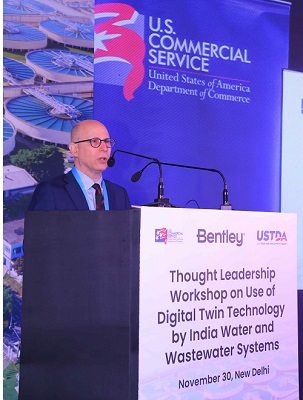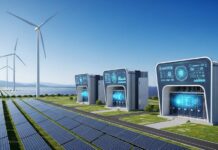Bentley Systems successfully concluded a Thought Leadership Workshop on the Use of Digital Twin Technology by India Water and Wastewater Systems on the 30th of November 2023. It was hosted by the United States Commercial Service, the United States Trade and Development Agency (USTDA), and Bentley Systems. The objective of this workshop was to increase awareness about water digital twin solutions among governments, water utilities, and industry stakeholders.
The event featured senior industry leaders from the water sector, who shared their perspectives about the role of digital twin technology. Participants included:
- D. Thara, additional secretary, Ministry of Housing and Urban Affairs
- Dr. M. Dhinadhayalan, advisor, Central Public Health and Environmental Engineering Organization
- Dr. Sanjay Dahasahasra, member, National Task Force, Central Public Health and Environmental Engineering Organization
- Jonathan Heimer, minister counselor for commercial affairs, U.S. Commercial Service
- Snehalkumar Bokare, industry director, water, Bentley Systems
- Mehnaz Ansari, senior regional representative – South Asia, USTDA India
The event included over 45 senior delegates from organizations that include the Ministry of Housing and Urban Affairs, the Ministry of Jal Shakti, Central Public Health and Environmental Engineering Organization, Delhi Jal Board, Punjab Water Supply & Sewerage Board, Central Ground Water Board, National Mission for Clean Ganga, Uttarakhand Payjal Nigam Dehradun, NDMC, WAPCOS, and other representative from the Indian media.
Digitization is emerging as one of the key pillars for achieving water resilience in India. Government schemes, such as Jal Jeevan Mission and AMRUT 2.0, encourage the adoption of new and advanced technologies, and have generated numerous opportunities to introduce innovative and digital solutions. When deploying best practices and technology solutions to attain 24×7 water supplies in India, we should focus on climate change while considering the water sector.
We should look at water as a whole concept and then work toward the minute aspects related to it. The lifecycle of the water industry comprises multiple phases, including preplanning, planning, construction, supervision, and asset management. Also, assets created for the water industry include the pipe supply, organizational distribution networks, elevated storage reservoirs, water treatment plants, and sewage treatment plants. Climate change, sustainability, the United Nations sustainable development goals (SDG), and net-carbon zero emissions are some of the key megatrends the global wastewater industry should consider. We see one aspect common across these trends – digitization. Digitization helps us achieve the ethos of what we want to create, which is mainly the provision and sanitation of water. Well-informed decisions are key to achieving the SDG milestones, one of which is clean water provided through the right technological applications and platforms that create resilient and sustainable water infrastructure.
 At this year’s COP28 event, one of the important topics was the world recognizing the urgent need for decarbonizing infrastructure. For decarbonization to take place, we need quality infrastructure. While 75% of the needed infrastructure is in place, we still must create more, which will easily take two decades. In this process, various climate change issues are expected to emerge due to carbon emissions. Hence, we need to create safe, sustainable assets, which can be done by following the greenhouse gases protocol. It is also critical for our product manufacturing to be carbon neutral from day one.
At this year’s COP28 event, one of the important topics was the world recognizing the urgent need for decarbonizing infrastructure. For decarbonization to take place, we need quality infrastructure. While 75% of the needed infrastructure is in place, we still must create more, which will easily take two decades. In this process, various climate change issues are expected to emerge due to carbon emissions. Hence, we need to create safe, sustainable assets, which can be done by following the greenhouse gases protocol. It is also critical for our product manufacturing to be carbon neutral from day one.
Today, 61.67% of India’s economy is based on farming and agriculture. Climate change is causing havoc, such as the state of Rajasthan flooding – even though it is a desert area – and additional flooding across major cities due to heavy rain, presenting challenges to the water industry and its infrastructure. These floods have a direct impact on farmer production and on India’s economy. Hence, we must overcome these challenges by constructing water assets and by keeping climate as one of our key priorities.
Some challenges that the water industry faces include aging water infrastructure, an aging workforce, regulatory pressures, public scrutiny, rising maintenance costs, climate change impacts, nonrevenue water, mounting pressure to meet 2030 sustainability goals, access to clean water and sanitation, and basic human needs for health and well-being (which is the UN SDG6). We must make cities resilient and sustainable with better water management (SDG11), as well as strengthen resilience and adaptation to climate incidents and natural disasters (SDG13).
Water leaders are embracing digital evolution to provide a secure future for all of us. Bentley Systems helps users address the sector’s challenges with technology that enables the creation of excellent infrastructure. Across the infrastructure lifecycle, digital twins have become mainstream. Today, they are critical enablers of how infrastructure assets are designed, built, and operated. Bentley Infrastructure Cloud, and ProjectWise in particular, is the foundation for managing infrastructure digital twins, unlocking data, and applying artificial intelligence and machine learning to projects, advancing infrastructure intelligence.

































